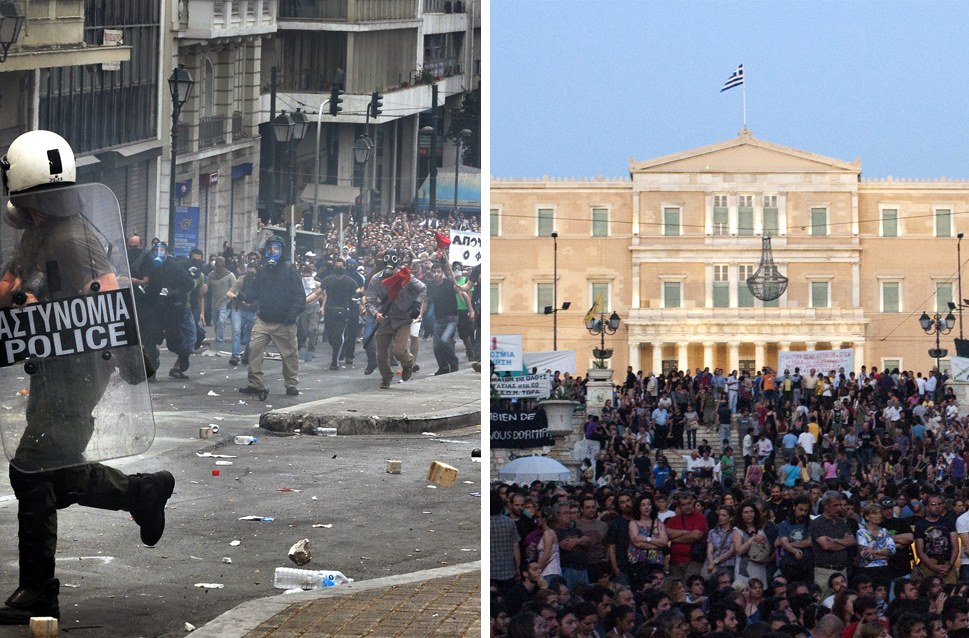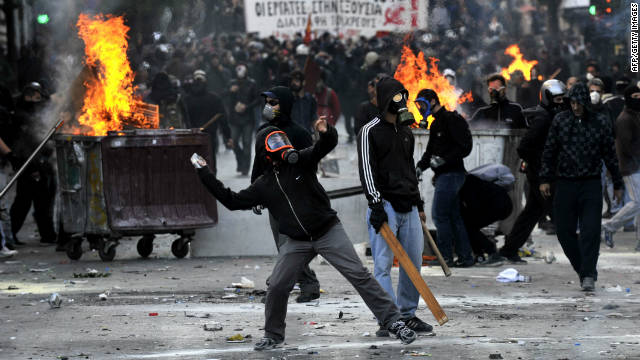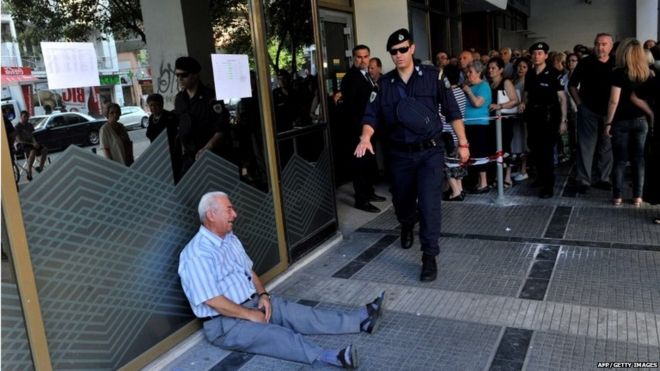
As Greece keeps falling to new levels of despair, more similarities with the Argentine economic collapse and its aftermath keep showing up. In spite of the differences between a Latin American country and a member of the EU, there are striking similarities between the two, especially regarding how the crisis affected people and how they cope with it.
The most obvious difference is that Greece is part of the EU, meaning it has means of getting even more money in spite of the massive debt that caused the problem in the first place. We can debate how much of a solution it is to go further into debt but this simply wasn’t an option for Argentina. Argentina wasn’t part of a main global power. Then again, Argentina is almost 20 times the size of Greece. All European Union countries put together ad up to 4,324,782 km2 . Argentina extends over 2,780,400 km2. Argentina has significant natural resources and is a strong primary producer while Greece depends mostly on the export of refined oil (which it first needs to import) cotton and tourism. Argentina has its own currency which it was able to devaluate, which works as pressure release valve, including the ability to print its own money. Greece has to stick with the Euro which it does not control. On the other hand, after its default Argentina became a no-go zone for investors, while Greece still has the Euro and is backed by its EU member status.
The Greek crisis had three possible outcomes. First, the one the media loved talking about the most given the tragic implications, catchy name tag included: Grexit. Greece would leave the EU, or get kicked out of it. They would drop the Euro and start printing its own currency. Alexis Tsipras anti-austerity stance was what got him elected in the first place. The Syriza party was supposedly ready to do just that if left with no other choice by the Troika (European Commission, the European Central Bank and the International Monetary Fund). This would have been the path most similar to the one Argentina took. In the case of Argentina, this wasn’t a particularly bad economic decision. At least in the case of Argentina, having an already rich country, getting rid of crippling austerity demands and running your own economy would have been a way of getting back on its feet in a couple years and even having a vibrant economy within a decade. The problem with Argentina was its poor execution of such a plan due to corruption and political problems. The more Argentina recovered, fueled mostly thanks to rising soy prices, the more the ruling party took to buy political support and increase its own power. Argentina most certainly didn’t recover a year after the default. It managed to get a couple mouthfuls of air by 2003 but for all practical purses 99% of Argentines saw a non-stop decline in their quality of life and standards of living since then.
The second option would have been the most favorable one for the people of both Greece and Europe: Reach a reasonable compromise. Find a middle point between the demands of the Greek people, an honest assessment of what they truly can and cannot do, and the demands of their creditors. In a true capitalist system there are penalties and rewards and if you poorly invest money you risk losing a percentage of that money (sometimes 100% of it!). It’s safe to say that investing in Greece’s economy was a poor investment, so losing some money is understandable. What does this mean? Creditors lose some money, they accept a haircut, just like Greeks accept some unpopular measures so as to get the help they needed from the institutions within EU intended for such purposes. No one is 100% happy but everyone has something to look forward to and recovery is possible.
Turns out the worst possible outcome is the one that played out. Greece got sold, like Argentina did during the 90’s with Carlos Menem. Everything that led to the crisis, more debt, more unemployment, more austerity has been accepted in exchange of a short term lifeline. The real winners here are the corporations that will cash in on the crisis. Greeks are now running the gauntlet Argentina went through 15 years ago and is still struggling with. The worse is yet to come for Greece. Greece’s economic circumstances may be even worse than Argentina’ in the long run, but this may be offset to a greater or lesser degree if they manage to avoid the kind of corruption and political collapse Argentina suffered.
As for the day to day life on the streets of Greece and what the people have to deal with it’s basically a carbon copy of Argentina after the default:
1)Cash-hungry
As banks close their doors and limit people to just 60 Euros per day in cash, the society desperately turns to cash. These days in the streets of Greece, just like it was in Argentina back in the day and still is over a decade later, cash is indeed king. If you have it, you have much greater leverage for negotiation than the guy with money stuck in the bank.
2)Hunting for ATMs and waiting in Line
It becomes a daily task to find an ATM with cash, find one in a safe location, and hopefully one that isn’t packed full of people. Unfortunately there’s no way around it and for many having to wait several minutes or even hours at an ATM or bank line becomes a reality. The solution? Patience. Patience or the stress will eventually kill you. Meditate, do yoga, watch a romcoms, spend time with friends or just do anything you enjoy doing. During an economic collapse you cannot let stress and depression get to you. This is the silent killer that destroys most lives during such events.
3)Budgeting
With a 60 Euro daily limit you have no choice but to make the most of it. People that thought they knew how to keep an eye on their expenses have a newfound meaning for the word “budget”. Money can’t be wasted and must be spend on the basics in the most efficient manner possible. Instead of going to the movies you go for walk. Out to a restaurant? No, lets do a picnic with a couple sandwiches. Spending 10 bucks on beer in a pub? Not anymore, those were the good old days. Even when it comes to food your approach is different. Instead of buying ready made quick microwave meals its about buying rice, pasta and getting the most calories per buck spent.
4)Barter
With high unemployment, banks closed and little money on the streets it’s natural that people turn to barter just like they did in Argentina. Having actual cash is of course better and how well barter work is the topic of another article, but when you don’t have anything else you try to make the most of it. It sure isn’t the utopic fantasy many preppers believe it to be.
5)Crime for Cash
With more cash on the street and kept at home, criminals know there’s more loot to be found in most homes. The Greek government saw the risk of robbery in ATM lines as well and increased the police presence. Poverty and social instability combined with corruption always leads to more and more violent crime. This is something Greeks should be preparing for. As bad as you may think it already is, it will get a lot worse.
https://www.phantis.com/blogs/ioannis-michaletos/rising-trends-greek-organized-crime
6)Suicide
The first two years after the Greek austerity programs suicide rates went up 35%. This same thing happened in Argentina after the economic collapse. Spain also saw a sharp increase in suicide rates after the crisis. In my case, when I think of suicide rates I remember the trains. Whenever there were problems with trains, you knew it was because someone killed himself. For years this would happen pretty much every week in one railway or another.
Greek Crisis Has Seen a Rise in Suicides and Depression
http://www.newsweek.com/greek-crisis-has-seen-rise-suicides-and-depression-353056
7)Riots and Civil Unrest

Molotov bombs, tear gas, rubber bullets. It all becomes part of everyday life. Eventually demonstrations become protests which the government doesn’t bother addressing anyway. These become roadblocks and a pain for commuters. When protesting isn’t enough, when people are too poor, maybe even hungry and simply mad, looting starts happening more often. You just learn not to get involved and just walk past stores being looted and sporadic riot. You try not to think about it too much just avoid the area.
8)Political fallout
In the case of Argentina the signs said “Que se vayan todos”, which means get rid of them all, in reference to politicians. Argentines just stopped believing in politicians all together. All they do is talk and once they are elected all they do is steal. Syriza came to power thanks to its anti-austerity banner, only to then rotate 180º and accept even worse bailout conditions. I doubt Greeks in general have much trust in politicians by now.
9)Austerity and Mass emigration
With half the people in Greece under 25 unemployed, it is understandable that many chose to leave. 200.000 Greeks have left Greece since the crisis started. The same number of Argentines escaped to Europe alone after the economic collapse.
More austerity will mean even less jobs, but most of all far worse living conditions for everyone no matter what age. Argentina, Greece and anywhere else in the world, when SHTF for real those that can will escape looking for a better future.
http://www.youthemploymentdecade.org/en/repor/emigration-the-only-solution-for-young-greeks/
10)The elder are among the most vulnerable

Being retired and living off a pension is not much better than being young and unemployed when an economy collapses. At a certain age, you don’t have tools left to work with and whatever pension you have will have to do. Inflation eats up the purchasing power of such a fixed income and it hardly ever keeps up with it.
As banks close and capital controls are enforced, the less tech savvy ones such as older people are particularly sensitive. Many older folks out there don’t even use ATM cards and will always go to the bank so as to speak with an actual person to get their money. These people are particularly vulnerable. In the case of Greece, even with closed banks they had to open for some time just to help such people. The exact same thing happened in Argentina and the images were just as sad.
11)Corruption
Corruption exists everywhere and it is true that in some places it is worse than others. Maybe there’s more corruption, maybe it’s the type that allows for worse things to happen. Sometimes there’s a lot of it but a façade is kept so as to keeping up appearances. What you can be sure of is that as poverty gets worse and people get more desperate it becomes the law of the jungle out there. Its every man for himself and whatever can be done to survive goes. Corruption also becomes a part of life and eventually it becomes the reason why getting out of the mess is so hard. The worst part is when corruption becomes socially accepted and for an entire generation that’s all they ever knew. For them, it becomes a goal to get politically involved in certain parties with the specific purpose of gaining financial leverage if not downright stealing from public funds.
12)Poverty and ending up Homeless

That’s what it comes down to, doesn’t it? When its all said and done, when the numbers and stats have been published and discussed ad nausem its about being poor or even worse ending up homeless and eating out of the trash to survive. This was the reality for tens of thousands in Argentina after the economic collapse. Every night the streets would get flooded with “cartoneros”, trash scavengers. Officially they are looking for recycling material. There’s a much grimmer reality though. I’ve lost count of how many times I’ve seen people grab a quick bite out of something they found while going through trash on the sidewalk. Watching children as young as five eat out of a garbage bag is not something you want to see. Another particularly tragic moment I’ll never forget happened while running errands in the Capital of Buenos Aires one day. I came across this very old lady, about eighty years old. She was well dressed had nice makeup. There was a dignity about her that reminded me of my grandmother. She was holding on to the burglar bars of a window (all windows in Buenos Aires have those) for support and she was crying. She had a small suitcase with her. I couldn’t help stopping and asking what was wrong. I thought she had been mugged, that happens a lot or maybe she got lost. But no. She said she had lost her home and now had no one and nowhere to go. You could tell just by the way she was dressed but most of all by how she stood in spite of barely being able to stand on her feet, this was a woman that had worked hard her entire life and didn’t deserve this.
I don’t even remember what I said to her. I do know I didn’t do anything to help her because there was nothing I could do. Like millions of others, I could barely take care of myself and my family let alone help anyone else.
When all is said and done, when the numbers have been crunched, the billions made by the hedge funds and politicians, its millions of lives that have been ruined so that a handful can reap their evil harvest.
Fernando “FerFAL” Aguirre is the author of “The Modern Survival Manual: Surviving the Economic Collapse” and “Bugging Out and Relocating: When Staying is not an Option”.








5 comments:
1) One of the things you notice about the lying news media and the lying politicians is that they never discuss wherethemoney went. Who got richer and who got poorer. Anyone wantto guess which EU banks have accounts to hold the money stolen from Greece by past tax evasion, etc? Or how much Greece's creditors did to aid past Greek corruption? I wonder when the lowly Mafiz loan sharks finally catch on and start lending to politicians?
Amazing post, Fernando.
I hope you and your family are doing well.
I hope you post to the Zero Hedge website. A lot of great economic news and comments.
it is a fraud, as simple as that. They want to steal the national wealth of Greek people,land, public water system, electricity system, ports, airports, railways, mineral resources, private property etc we are talking about Real wealth not printed papers...of course other nations are to follow.
While I agree with most of your article, I'm not sure that I agree about all the conclusions.
I tend to blame corrupt politicians much more than banks. Perhaps they are in collusion, I don't know. I don't see any hedge funds making money, they probably lost all of it.
I feel sorry for the people of Greece, but it is they who continue to vote the corruption in. That must be stopped.
Both Argentina and Greece make very solid arguments, IMO, against foreign aid altogether. Let each country stand on it's own.
Re Anon at 8:21 am
How can you avoid voting corruption in -- when the politicans make you promises before the elections and then stab you in the back afterwards?
And it is not just Greece and Argentina. The US Democratic Party is a massive con game. I worked for the Obama campaign in 2008 -- both primary and general. Admittedly, I did it because I despised Hillary and John McCain. But I and many other Obama supporters have been aghast at how he shoveled money out to the Rich while dumping massive misery and unemployment onto the average citizens.
See
http://www.washingtonpost.com/politics/liberal-activists-see-bernie-sanders-as-champion-for-causes-failed-by-obama/2015/07/19/8b5fc752-2e09-11e5-8353-1215475949f4_story.html
The two outsiders getting support in the USA are Bernie Sanders and Donald Trump. Trump is a billionaire whereas Bernie Sanders is one of the few Senators who is close to being poor. But who is more likely to sell us out as President? Does anyone think Bill Clinton got that $200 million in wealth giving $700,000 speeches to the Little People after leaving the White House? Does anyone think Michele Obama hasn't noticed the value of Rich friends? I don't know -- maybe Trump is rich enough that he doesn't have to sell the lives of another 13,000 Americans to the Israel Lobby and Big Oil.
Meanwhile, who is going to pay off that $18 Trillion in US federal debt? And make good on the $40 Trillion shortfall in assets needed to make good on promises to baby boomers who have been paying into Social Security and Medicare "accounts" for 45 years. Accounts which are empty.
Post a Comment